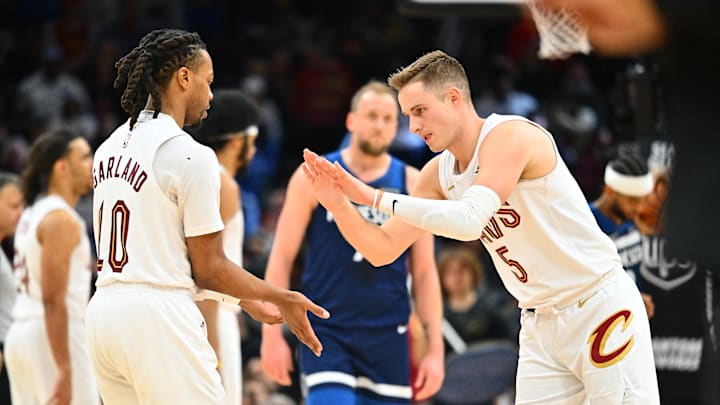Darius Garland will be absent from the Cleveland Cavaliers on opening night and for a lengthy stretch after that.
Garland's severe toe sprain during the NBA playoffs required an offseason surgery which placed him on the sidelines for months. Even as he nears health, he is far from prepared for NBA basketball. The Cavs are forced to prepare for a start to the year without Garland and Max Strus as both players face worrisome injury woes and will require long-term substitutes in the starting five.
In wake of Garland's injury, much more backcourt responsibility will be thrust upon Donovan Mitchell, leaving him with a need for a reliable partner. Naturally, the Cavs could expect to employ newly-acquired Lonzo Ball. The former Chicago Bulls point guard will be Garland's backup, so moving him to the starting five is an easy answer. Cleveland, though, should steer clear of putting Ball in Garland's role.
As Ball begins his Cavs tenure, he brings with him his own laundry list of poor injury luck. Suddenly placing him in a high-usage, high-minutes role could jeopardize the Cavaliers' best chances to keep him healthy and available for the postseason. Ball fills a necessary role for Cleveland as a backup playmaker, offensive engine and defensive stalwart. If the Cavs lose their best backcourt bench leader, the strides made toward an NBA Finals run would be in peril.
Additionally, if Lonzo is going to orchestrate the second unit properly, he needs reps with the second squad sooner rather than later. Starting Lonzo would only hurt his on-court chemistry with the other bench players, making the Cavaliers delay integrating Ball into his actual job in the lineup. Instead of risking Lonzo's health and holding back his potential as a bench leader, the Cavs should pivot to a proven solution.
Sam Merrill needs to start next to Mitchell
In years past, the Cavaliers have trusted sharpshooting wing Sam Merrill to fill numerous roles in response to untimely injuries. Merrill has a strong sense of team-first basketball, serving as a two guard or small forward without hesitation. With his continued growth as a stady defender, his value to the Cavs' backcourt increases even further.
Merrill has filled in for Garland and Mitchell before, making his transition to a temporary starter much smoother than it would be for any other player. Mitchell has also shown well-developed playmaking abilities of his own since joining the Cavaliers, allowing him to serve as the starting point guard with Merrill in his original spot.
Placing Mitchell alongside Merrill adds another catch-and-shoot threat to the lineup, opening up the lanes for the rest of the team, as well. Last season, Merrill shot 38.2 percent on catch-and-shoot three-pointers on 4.3 attempts per game. Overall from deep, Merrill shot 37.2 percent on just over 5 attempts each night. With the majority of Merrill's three-pointers coming from catch-and-shoot opportunities, his utility as a starter is clear and has proven results.
Garland brings many different talents to the court than Merrill, but his veteran presence and track record is something the Cavaliers can trust and lean on until the roster is fully healthy. Merrill has also been durable, rarely missing playing time even with increased minutes. His impact on the team is probably best demonstrated by his fluidity and immediate production in every role he plays.
Lonzo Ball is undoubtedly a better point guard than Mitchell or Merrill. He is also an ideal solution to many of the Cavs' drawbacks and historically shallow backcourt depth. What gives his skillset so much value is being able to lead the second unit that has never had a real facilitator since Ricky Rubio's departure. Relying on Merrill as Garland's replacement over Ball saves the Cleveland Cavaliers from returning to bad depth and a status quo that has consistently under delivered.
